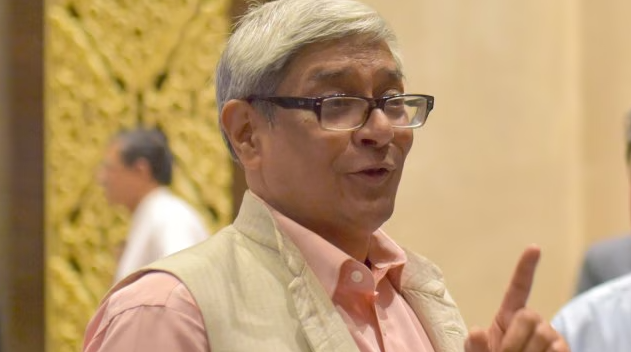Bibek Debroy Committee on Reforms in Indian Railways (GS Paper 2, Governance)

Introduction
- The Bibek Debroy Committee, constituted in 2014, was tasked with recommending reforms to enhance the operational efficiency, financial viability, and competitiveness of Indian Railways.
- Chaired by economist Bibek Debroy, the committee’s 2015 report proposed transformative changes aimed at addressing key challenges facing the railway sector, including outdated organizational structures, financial management inefficiencies, and a lack of competition.
- The committee's recommendations have since sparked significant debate and, in many cases, led to partial implementation by the government.
Key Recommendations of the Bibek Debroy Committee
Empowerment of Railway Officers
- One of the committee’s central proposals was to decentralize decision-making authority by empowering field officers such as General Managers (GMs) and Divisional Railway Managers (DRMs).
- This was intended to improve operational responsiveness and accountability.
- The government has partially implemented this recommendation by granting GMs and DRMs greater autonomy in managing tenders, making independent decisions, and running divisions as business units.
Establishment of an Independent Regulator
- The committee recommended creating an independent regulatory authority to ensure fair competition, set service pricing, and regulate the railways’ operations.
- In 2017, the government established the Rail Development Authority (RDA) to oversee these areas.
- The RDA is tasked with advising on service pricing, enhancing non-fare revenue, and fostering a competitive environment.
Liberalization of Indian Railways
- The committee advocated for the liberalization of rail services, enabling private operators to participate in running trains.
- This was aimed at increasing efficiency, reducing costs, and improving passenger services.
- While this recommendation did not equate to privatization, it was meant to create a competitive environment.
- However, political opposition and resistance from railway unions have limited the scope of this recommendation.
- Private participation has been restricted to Public-Private Partnership (PPP) projects, primarily in freight services, and has not extended to passenger services.
Redesignation of Railway Board Chairman as CEO
- To streamline decision-making and improve accountability, the committee recommended that the Chairman of the Railway Board be designated as the Chief Executive Officer (CEO), giving the position final decision-making authority.
- This recommendation was implemented in 2020, with the first Railway Board Chairman appointed as CEO.
- This move was seen as a step toward making the board function more like a corporate entity, with increased focus on efficiency.
Offloading Non-Core Services
- The committee suggested that Indian Railways should focus on its core function—running trains—and offload non-core services such as security, medical facilities, and educational services to specialized agencies.
- The government has begun considering this recommendation as part of efforts to reduce operational complexity and enhance the focus on essential railway functions.
Reforms in Accounting System
- The committee recommended a shift from cash-based accounting to accrual-based accounting for greater financial transparency.
- This was implemented under the Accounting Reforms project, and Indian Railways now prepares financial statements on both cash and accrual bases, improving its financial reporting.
Safety Measures and Rashtriya Rail Sanraksha Kosh (RRSK)
- Safety was a priority in the committee's report. In response, the Ministry of Railways established the Rashtriya Rail Sanraksha Kosh (RRSK) in 2017 with a ₹1 lakh crore fund to replace, renew, and upgrade critical safety assets.
- In 2022-23, the government extended the RRSK with an additional ₹45,000 crore in budgetary support.
Integration of Advanced Technology
- The committee advocated for the adoption of advanced technologies to modernize railway operations, including high-speed trains like the Vande Bharat and the safety system KAVACH.
- Additionally, the establishment of Gati Shakti Vishwavidyalaya, a university focused on rail technology and skills development, reflects the committee’s vision of enhancing the workforce's capabilities in modern rail technologies.
Implementation Status
Of the 40 recommendations made by the Bibek Debroy Committee:
- 19 recommendations were fully accepted and implemented. These include:
- The redesignation of the Railway Board Chairman as CEO.
- Reforms in the accounting system (accrual-based accounting).
- The creation of RRSK for safety improvements.
- 7 recommendations were partially accepted, such as:
- Empowering DRMs and decentralizing decision-making to the divisional level.
- 14 recommendations were rejected or deferred, mainly due to political resistance and concerns from railway unions. The most contentious of these was the liberalization of passenger services, which has faced significant opposition.
Conclusion
- The Bibek Debroy Committee laid out an ambitious vision for the transformation of Indian Railways, aiming to make it more efficient, competitive, and financially sustainable.
- Several of its recommendations have already been implemented, leading to structural changes, improved financial transparency, and enhanced safety measures.
- However, key areas, particularly the liberalization of passenger services and full privatization, remain contentious and have not been fully realized due to opposition from unions and political considerations.
- While significant progress has been made in modernizing Indian Railways, the journey toward complete reform continues.
- The government’s future approach will likely balance the need for efficiency and competitiveness with the concerns of workers and political stakeholders.


